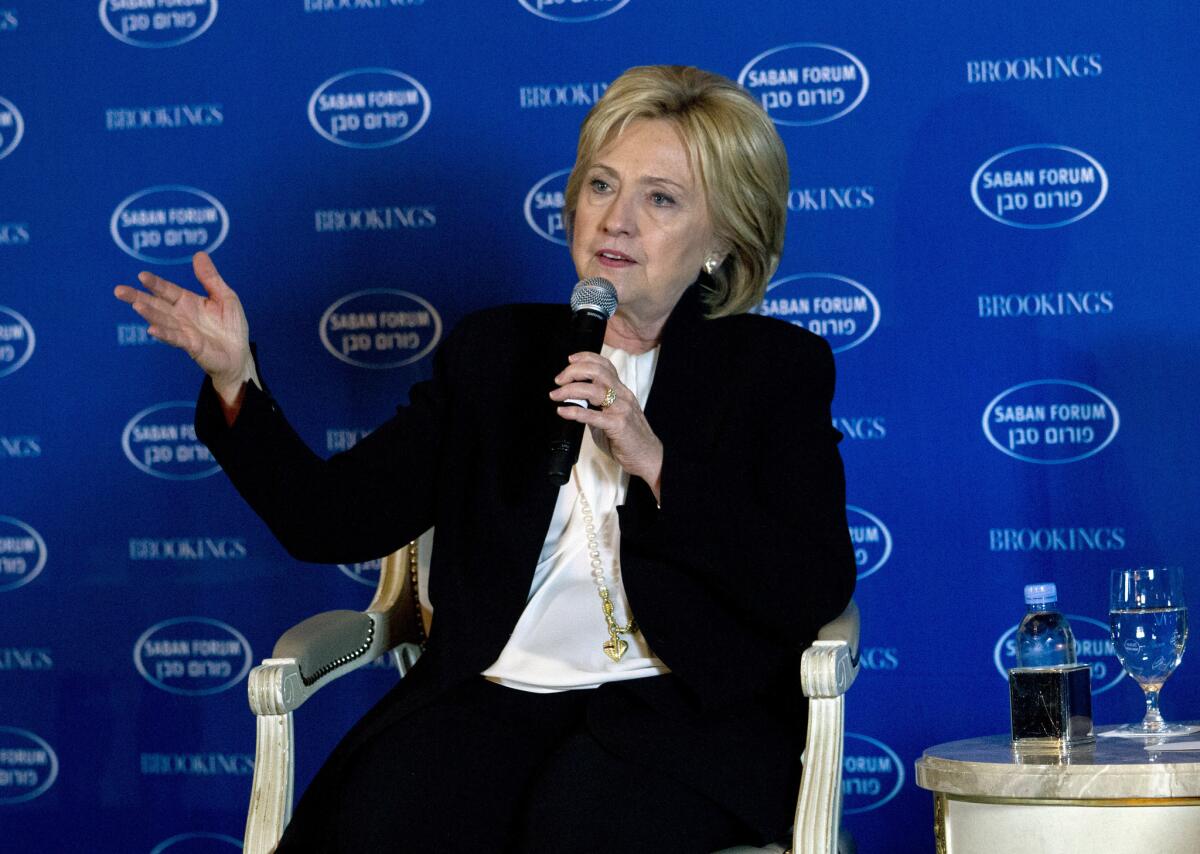Hillary Clinton says tech firms must work to deny ‘virtual territory’ to Islamic State

Democratic presidential candidate Hillary Clinton speaks at Saban Forum 2015 in Washington, D.C., on Sunday.
- Share via
Reporting from Washington — The nation’s technology firms need to do more to work with the government to fight Islamic State online, Hillary Clinton said Sunday, warning that the San Bernardino attack shows that tech firms and intelligence agencies are failing to do enough to stop the militant group’s viral recruitment efforts.
“Resolve means depriving jihadists of virtual territory just as we work to deprive them of actual territory,” Clinton said during a major foreign policy address, which she opened and closed by stressing the technological challenge that terrorism poses.
Clinton emphasized the alarming success the Islamic State group has had in luring recruits and planning attacks through social media and encrypted online channels, saying that combating the militants online has to become a higher priority. And she made clear that she understood her call will generate controversy.
“You are going to hear all the usual complaints,” she said. “Freedom of speech, et cetera.”
But, she said, “if we truly are looking for ways to shut off their funding, shut off the flow of foreign fighters, we’ve got to shut off their means to communicate.”
“We are going to have to have more support from our friends in the technology world to deny [terrorists] online space,” she added. “We are going to have to ask our technology companies ... to help us on this.”
“The government is good in some respects, but nowhere near as good” as private industry in coming up with technological solutions, she said.
The push for a more robust online counterterror effort comes at a time when intelligence agencies have been under pressure to scale back their online surveillance. The extensive intelligence agency data collection efforts revealed by former National Security Agency contractor Edward Snowden spawned a national pushback against government snooping on private communications.
At the end of last month, the NSA ended its program of collecting data on the majority of U.S. telephone calls. Under legislation approved by Congress earlier this year, the government will now depend on telephone companies to hold that data.
Clinton did not mention the controversial NSA program, but instead focused on efforts to disrupt the spread of terrorist propaganda and recruiting.
The Islamic State, also known as ISIS or ISIL, is effectively using online platforms to become “the most effective recruiter in the world,” Clinton said. She noted that one of the attackers in San Bernardino had pledged her allegiance to Islamic State on Facebook, something investigators learned about only after Wednesday’s massacre.
“Technology is often called the great disruptor,” she said. “We need to put the great disruptor to work in disrupting ISIS, and stopping them from having this open platform to communicate.”
Clinton had raised the issue of combating ISIS online earlier this year, before the terrorist attacks in San Bernardino on Wednesday that killed 14 and in Paris last month that killed 130, but only in brief remarks with little follow up.
At a campaign town hall in New Hampshire in July, she said that more could be done to fight terrorism online. When the comments drew rebuke from Silicon Valley firms, campaign officials told reporters that the remarks did not reflect any new policy proposals Clinton was developing.
But on Sunday, Clinton was clear that stepping up the fight against Islamic State online is a priority and one that she is aware will likely cause conflict with social media and other technology firms.
For more on Campaign 2016, follow @EvanHalper
More to Read
Get the L.A. Times Politics newsletter
Deeply reported insights into legislation, politics and policy from Sacramento, Washington and beyond. In your inbox twice per week.
You may occasionally receive promotional content from the Los Angeles Times.










